-
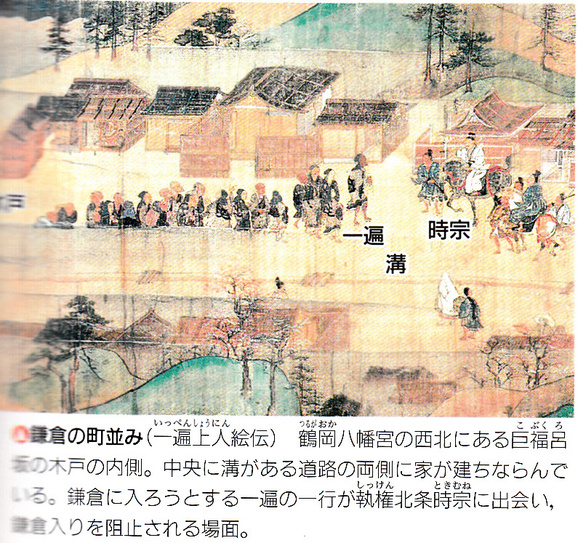
建久二年の強訴
建久二年の強訴(けんきゅうにねんのごうそ)は、建久2年4月26日(1191年5月20日)、延暦寺の大 衆が近江国守護・佐々木定綱の処罰を求めて起こした強訴。
-
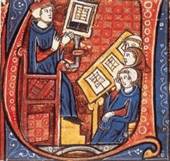
University of Paris strike, 1229
The University of Paris strike of 1229 was caused by the deaths of a number of students in punishing a student riot. The students protested with a "dispersion", or student strike, which lasted more than two years and led to a number of reforms of the medieval university. The event demonstrates the town and gown power struggles with the Church, secular leaders and the emerging student class and a lessening of local Church authority over the University of Paris. The university was placed squarely under direct papal patronage, part of the program to centralise the Church structure, which had intensified under Innocent III.
-
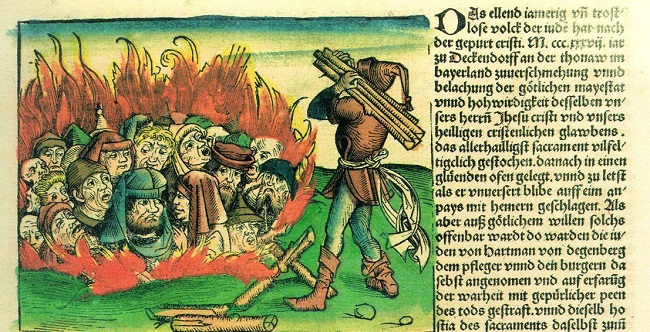
Armledererhebung
Mit Armledererhebung oder Armlederaufstand wird eine von Franken ausgehende Aufstandsbewegung bäuerlicher und städtischer Unterschichten bezeichnet, die von 1336 bis 1338 für eine Reihe von Massakern an jüdischen Gemeinden im südwestdeutschen Raum und im Elsass verantwortlich war.
-

1345 Liverpool riot
The 1345 Liverpool riot took place on St Valentine's Day that year when a large body of armed men entered the town of Liverpool and attacked the Courts.
-
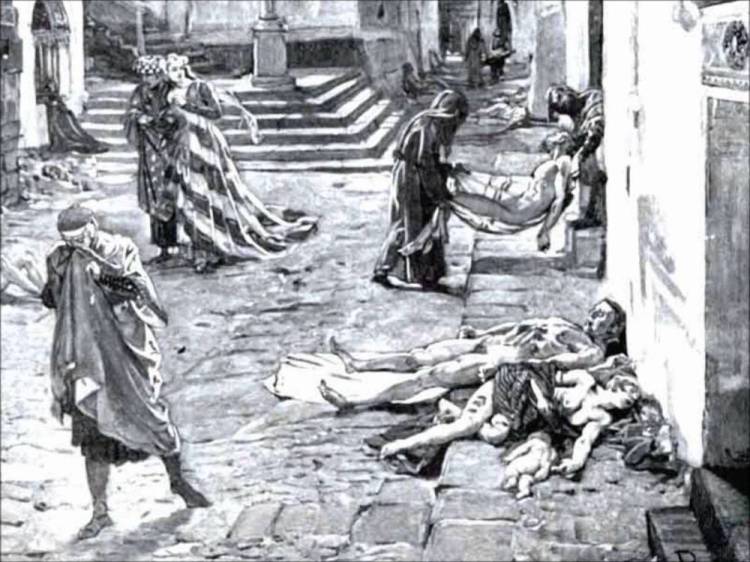
Basel massacre
The Basel massacre (Basler Judenpogrom) of January was an instance of persecution of Jews during the Black Death. An estimated 50 to 70 Jews were killed by burning.
-

St Scholastica Day riot
The St Scholastica Day riot took place in Oxford, England, on 10 February 1355, Saint Scholastica's Day. The disturbance began when two students from the University of Oxford complained about the quality of wine served to them in the Swindlestock Tavern, which was based at Carfax, in the centre of the town. The students quarrelled with the taverner; the argument quickly escalated to blows. The inn's customers joined in on both sides, and the resulting mêlée turned into a riot. The violence started by the bar brawl continued over three days, with armed gangs coming in from the countryside to assist the townspeople. University halls and students' accommodation were raided and the inhabitants murdered; there were some reports of clerics being scalped. Around 30 townsfolk were killed, as were up to 63 members of the university.
-

Jacquerie
The Jacquerie (French: [ʒakʁi]) was a popular revolt by peasants that took place in northern France in the early summer of 1358 during the Hundred Years' War. The revolt was centred in the valley of the Oise north of Paris and was suppressed after a few weeks of violence. This rebellion became known as "the Jacquerie" because the nobles derided peasants as "Jacques" or "Jacques Bonhomme" for their padded surplice, called a "jacque". The aristocratic chronicler Jean Froissart and his source, the chronicle of Jean le Bel, referred to the leader of the revolt as Jacque Bonhomme ("Jack Goodfellow"), though in fact the Jacquerie 'great captain' was named Guillaume Cale. The word jacquerie became a synonym of peasant uprisings in general in both English and French.
-
Peasants' Revolt
The Peasants' Revolt, also named Wat Tyler's Rebellion or the Great Rising, was a major uprising across large parts of England in 1381. The revolt had various causes, including the socio-economic and political tensions generated by the Black Death pandemic in the 1340s, the high taxes resulting from the conflict with France during the Hundred Years' War, and instability within the local leadership of London. The final trigger for the revolt was the intervention of a royal official, John Bampton, in Essex on 30 May 1381. His attempts to collect unpaid poll taxes in Brentwood ended in a violent confrontation, which rapidly spread across the south-east of the country. A wide spectrum of rural society, including many local artisans and village officials, rose up in protest, burning court records and opening the local gaols. The rebels sought a reduction in taxation, an end to the system of unfree labour known as serfdom, and the removal of the King's senior officials and law courts.
-

Revolta mallorquina de 1391
La revolta mallorquina de 1391 amb l'assalt al Call de la Ciutat de Mallorca, representa un primer enfrontament entre els estaments privilegiats del Regne de Mallorca i els menestrals i pagesos de l'illa, que donà peu a l'assalt dels calls jueus.
-

Pogrom de Barcelona
El pogrom de Barcelona del 1391 fou un assalt al Call de la ciutat de Barcelona instigat per agitadors religiosos catòlics entre el 5 i 8 d'agost del 1391 i que acabà amb la matança indiscriminada de ciutadans jueus si no acceptaven convertir-se al cristianisme. La violència fou tan gran que va destruir pràcticament el call. Hi perderen la vida assassinades més de 300 persones.
-

Fleglerkrieg
Der Fleglerkrieg, auch Flegelerkrieg, war ein Bauernaufstand und eine kriegerische Auseinandersetzung zwischen verfeindeten Adligen im Raum Harz von 1412 bis 1415, ein Vorläufer des großen Deutschen Bauernkriegs.
-

Defenestracja wrocławska
Defenestracja wrocławska – nazwa zajść i zamieszek we Wrocławiu, które miały miejsce w dniach 18 lipca – 22 lipca 1418 roku. Wyraz defenestracja oznacza wyrzucenie przez okno. Do historii przeszły przede wszystkim te akty, które dotyczyły wyrzucenia lub wyskoczenia, zwykle nagłego, przez okno znienawidzonych notabli sprawujących władzę. Zamieszki wrocławskie były efektem napięć społeczno-politycznych, których przyczyny jawią się jako na tyle skomplikowane, że zagadnienie ich genezy można rozpatrywać w kilku kontekstach. Można doszukiwać się ich podobieństw m.in. do defenestracji praskich. Zarówno pierwszej z 1419 roku, jak i drugiej późniejszej o dwa stulecia. Podobnie jak druga defenestracja praska była wstępem do wojny trzydziestoletniej, tak defenestracja wrocławska była wstępem do wojen husyckich.
-
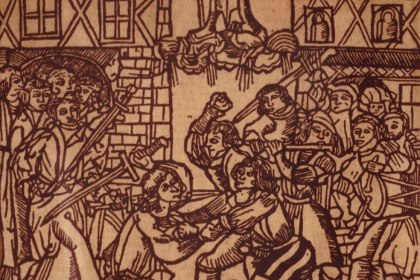
Vienna Gesera
The Vienna Geserah (German: Wiener Gesera, Hebrew: גזרת וינה) was the planned annihilation of the Jewish communities in the Archduchy of Austria in 1421 on the orders of Duke Albrecht V , the later Roman-German King Albrecht II. The annihilation was planned by forced baptism, expulsion and execution by burning. The name derives from a Jewish chronicle called "Wiener Gesera" and is also used for the events described therein.
-

Davidin kapina
Davidin kapina oli Ylä-Satakunnassa vuosina 1438–1439 tapahtunut talonpoikaiskapina. Liikehdintä levisi Vesilahden ja Lempäälän pitäjistä myös läheiseen Hämeeseen. Samaan aikaan Davidin kapinan kanssa myös Karjalassa oli vastaavia kapinailmiöitä.
-
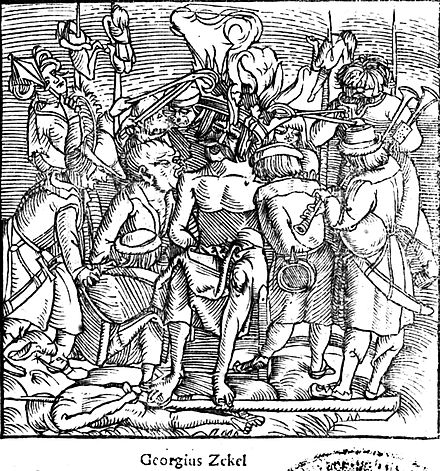
Transylvanian peasant revolt
The Transylvanian peasant revolt (Hungarian: erdélyi parasztfelkelés), also known as the peasant revolt of Bábolna or Bobâlna revolt (Romanian: Răscoala de la Bobâlna), was a popular revolt in the eastern territories of the Kingdom of Hungary in 1437. The revolt broke out after George Lépes, bishop of Transylvania, had failed to collect the tithe for years because of a temporary debasement of the coinage, but then demanded the arrears in one sum when coins of higher value were again issued. Most commoners were unable to pay the demanded sum, but the bishop did not renounce his claim and applied interdict and other ecclesiastic penalties to enforce the payment.
-

Böser Bund
Der Böse Bund wurde am 2. Mai 1445 während der Landsgemeinde in Aeschi bei Spiez, im Berner Oberland geschlossen. Es war die grösste Bauernrevolte des 15. Jahrhunderts im Berner Oberland.
-

Berliner Unwille
Als Berliner Unwille wird die 1440 begonnene Auseinandersetzung der Berlin-Cöllner Bürger mit dem märkischen Landesherrn Friedrich II. um den Bau einer Burg auf der Spreeinsel und der damit verbundenen Verpflichtung zur Abgabe von Land bezeichnet. Im Laufe der Auseinandersetzung, in der es im Wesentlichen um den Versuch ging, die Autonomie der Stadt mit 8000 Einwohnern gegen die Entscheidungsbefugnis der Landesherren zu verteidigen, wurde unter anderem die Baugrube der Burg, der Keimzelle des späteren Stadtschlosses, im Frühjahr 1448 unter Wasser gesetzt. Der 1448 gefundene Kompromiss war, was die städtische Autonomie anging, eher ein Verlust für die Städter, denn er leitete im ganzen Reichsgebiet eine Welle der fürstlichen Aktionen gegen städtische Freiheiten ein.
-

Toledo revolt of 1449
no info
-
Carinthian Peasant Revolt
The Carinthian Peasant Revolt (German: Kärntner Bauernaufstand; Slovene: koroški kmečki upor) took place in the Duchy of Carinthia (present-day Austria and Italy) in 1478. It was the first of several larger peasant revolts in the area of Inner Austria. After several Ottoman raids from 1473 onwards, the rural population established a peasants' association that was an effort to take the defence of the farmers' homes into their own hands and was also aimed against the ruling nobility that had failed to protect the farmers from attacks by marauding Turkish akinji cavalry. The revolt was eventually suppressed.
